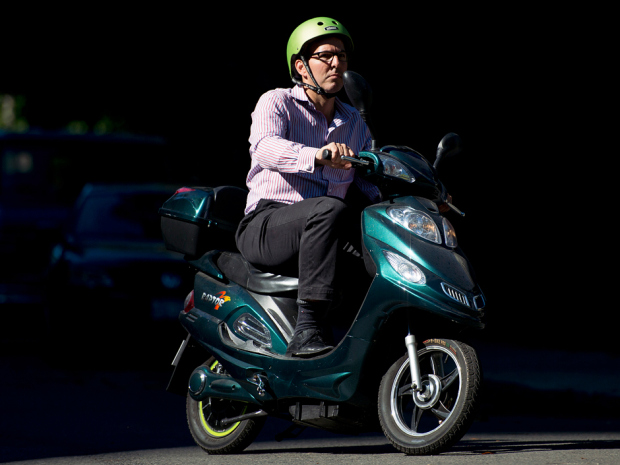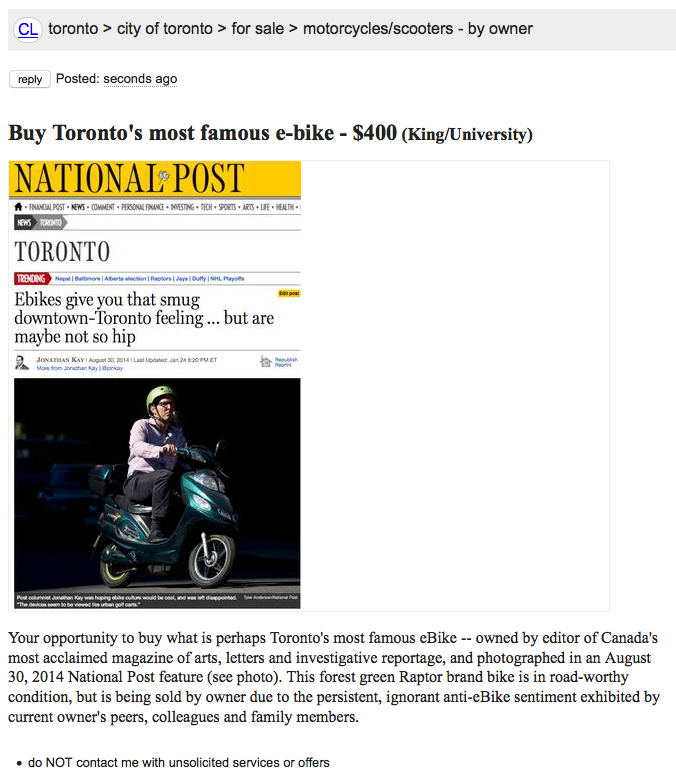
Hi Kyle. I hope you’ve recovered from yesterday’s lunch, which you clearly seemed to enjoy. Indeed, you and Matt were cackling so hard, I’m surprised you were able to push any sushi down your gullets. It’s gratifying to know that my use of an ebike provides such endless mirth. Truly. The laughter of my colleagues is my favorite kind of music.
But perhaps a more sensitive soul might have noticed that not everyone at the table was laughing—which brings me to the subject of my new essay, attached below. Since you figure prominently in this cri de cœur, I thought it only fitting to assign you the task of editing it for publication in The Walrus and/or thewalrus.ca.
In doing so, perhaps you will take the opportunity to examine your own prejudices—and “edit” them as well.
Jon
[breakline]City planners think of transportation in terms of its logistical and infrastructural components. That’s also how the issue gets discussed in the context of, say, energy conservation and traffic management. But when it comes to the transportation products we actually buy, our utilitarian calculus is overwhelmed by our aesthetic biases. When the Segway scooter had its great reveal in 2001, few observers cared about its groundbreaking self-balancing technology. All they saw was a nerd standing upright, wearing a funny helmet.
It is a lesson I have learned again over the last year, at great cost in dignity and personal reputation, as I have motored around Toronto on an ebike—a zero-emission electric scooter that travels at speeds of up to 32 km/h. As I noted in an essay last year, ebikes combine the low cost and convenience of a bicycle, while allowing a user to get to work without an ounce of sweat or a stitch of lycra.
In a more perfect world, the streets of our cities would be humming with ebikes. But that is not the world we inhabit. After a year of evangelizing these fantastically useful, earth-friendly contraptions among my peer group, I’ve failed to gain a single new convert.
Just the opposite, in fact: I have become a figure of overt and willfully cruel mockery.
I might have expected an anti-ebike bias to permeate the offices on my old employer, the National Post—where carbon is king, and the words “climate change” are still spoken of in scare quotes. But when I moved to the more eco-friendly Walrus a few months back, I had a right to expect a more enlightened attitude.
Instead, the opposite. Among downtown hipsters, I’ve learned, Father Fashion trumps Mother Earth every time.
When I mentioned my ebike at a group lunch with Walrus colleagues the other day, my digital editor said he’d always just assumed that most ebikers are alcoholics who’d lost their driver’s licenses. His tone suggested he thought that maybe this was my way of confessing a substance-abuse problem. Don’t be afraid to reach out, Jon: Help is available.
A dining companion—let’s call him Kyle W.—then told us about the time that, while jogging on a city bike path, he encountered a his-and-her set of ebikers out on an e-date. I found this to be romantic. Not so Kyle, who proudly recollected how he’d dressed down these two-wheeled lepers (“Get off the path, jackasses!”) as they trundled past.
This story set off spasms of coarse laughter around the table, and caused me to reflect on the equally insulting catcalls I’ve endured while on my own ebike (“road cow” being among the most inventive). Human rights codes forbid Canadians from discriminating against one another based on a long list of protected classes. And yet on our roads—government-regulated public spaces supposedly open to all, regardless of their transport creed—anti-ebike prejudice is overt.
Traditional cyclists, in particular, seem to grant themselves remarkable licence in vocalizing a sense of presumed moral superiority over their e-motorized counterparts. “It strikes me as the ultimate form of laziness, Jon—not that I am judging you,” wrote my friend Cary W. on Facebook, after I’d put up a post about ebikes. My own mother then added, for all of the Internet to see: “What is pathetic is that Toronto is a very flat city, and you could use a real bike with ease.” This from a woman who pays someone to organize her cutlery drawer.
Canada supposedly is experiencing an age of eco-tyranny, whereby we all are judged mercilessly according to the greenness of our lifestyle. My ebike oppression suggests the opposite is true. I doubt that even one of my hip, straphanger, media-party confreres would have the bad manners to harangue me if I arrived at work in, say, a Lincoln Navigator or Toyota Sequoia. If I owned one of those deafening Harley Davidson motorcycles, folks would crowd around and ask for a ride. Yet let my radio-host friend John Moore catch sight of me in my green ebike helmet, and he thinks it’s just hilarious to call me out at lunch as “The Great Gazoo.”
Journalists often are sent manifestos from oddballs who claim that the oil companies are suppressing miraculous inventions, like flying cars that run on water. But the real reason why so many of us are still reliant on century-old gas-guzzling technology originates not in smoke-filled rooms, but in prejudice-addled minds.
Who killed our electric dreams? Not Texaco. Not BP. Not Chevron.
It was you, my hipster friend. It was you.
Jon,
Due respect, but you need to get off your eco-high horse. Publishing this in the magazine or on the website is about as dumb—and embarrassing—as you carrying your wannabe motorcycle helmet to lunch in your backpack.
If you really think it’s worth my time to edit this, then fine. But let’s get something straight: I don’t “jog.” I run.
Kyle
Oh. Oh. So you don’t *like* it when people make flippant references to your personal-conveyance choices. Huh. Wonder how that feels.
p.s. That’s a great big STET on “jog.”
[breakline]Okay, see this is the problem with ebikes and people who ride them. They—you—want everything both ways. Motor vehicle and self-propulsion. Streets and sidewalks. Apparently you also want to write woe-is-me banalities while insulting your employees.
The copy editor won’t like “jog” any more than I do. And let’s remember that he reports to me.
Lots of house style violations here (Don’t be afraid to reach out, Jon: help on style is available), which I’ll tackle in a line edit. A few things, though:
:: I’m pretty sure Lycra is proprietary. This is why we fact-check pieces, and why you need to stop arguing against the process.
:: Why is Matt your “digital editor” but I’m just a “dining companion”? Is this still about that error in your first editor’s note for the magazine? I said I’m sorry.
:: I think you need to zoom out the perspective, especially toward the end, because this version reads like a city magazine piece. Do all of our readers even know what “hipster” means—let alone a “downtown hipster”? Too insidery. Not coast-to-coast-to-coast enough.
Kyle
[breakline]Does “digital editor” pay more than “online editor”? Someone let me know so I can decide whether to like this promotion(?) of mine.
M –
p.s. Road cow.
p.p.s. Jon, “all of the Internet” cannot see your Facebook page.
[breakline]Kyle, I will let you play with the commas, semicolons, spellings, and mundane fact-checking chores. They didn’t give me the corner office so I could spend my days rooting through the Walrus style guide. Oh, and look: I made your job easier by finding you a nice illustration to go with the piece. Please see attached, screen-grabbed from Craigslist. Yes, I’m selling the thing. Hope you’re happy.

Easy with the tone of martyrdom there. You’re not exactly the Rosa Parks of ebikes, Jon.
I agree that it would be inapt for me to compare myself to Ms. Parks. On the other hand, there is no doubt that the twinned themes of prejudice and transportation access are prominent features of both of our narratives. In her era, as in ours, the question for the Kyles of the world is: Which side of history do you want to be on?


